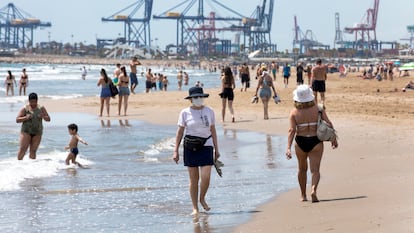After dismal spring, Spain’s tourism industry prepares for record-low summer season
Although there has been a slight rise in hotel reservations, leaders from the sector warn that the numbers this year will be far from what they were in 2019

April 2020 was defined by the complete collapse of tourism in Spain due to the coronavirus crisis. Recent figures from Spain’s National Statistics Institute (INE) show that the industry has come to a complete standstill, a problem that is likely to persist into the much-anticipated summer season.
Hotels have recorded a slight rise in reservations for July and August, but this increase means little given that not a single tourist visited Spain in April. Sources from the hospitality sector expect that just over half of all hotels in Spain will open in summer and at a very low occupancy rate. “Places that are usually 80% or 90% full in summer, will be at around 25% [occupancy],” explain top executives from the sector.
It is vital to create a map of the safe regions in Europe to enable travel corridors as soon as possible so that it can have some effect before JulyLuis Zoreda, deputy president of Spanish tourism lobby Exceltur
The tourism sector in Spain is in crisis. Since mid-March, when the Spanish government declared a state of alarm in a bid to halt the coronavirus outbreak, the industry has been in a coma-like state. Not a single hotel opened in April. Half of all workers on Spain’s temporary layoff schemes, known in Spanish as ERTEs, are from the tourism sector. On Monday, the INE confirmed that not one international visitor showed up, leading to zero tourist spending. This 100% contraction represents a serious blow to the economy, since tourism accounts for more than 12% of Spain’s gross domestic product (GDP).
And the problems look set to continue into the summer high season. “This summer will not be like any other year,” says Antonio Catalán, the head of the hotel chain AC by Marriott. This is a view shared by José Luis Zoreda, the deputy president of the Spanish tourism lobby Exceltur, who says, in almost the same words, that “this season will not even be close to last year’s.”
Other hotel spokespersons say that while there has been a slight rise in hotel reservations, this does not indicate that the sector will bounce back to 2019 levels. “We are starting from zero. Is the situation improving? Yes, but it will not be comparable to last summer,” says sources from the Barceló hotel chain.
Sources from the Melía hotel group agree: “Reservations have quadrupled compared to those from last week, especially for August. At any rate, it will be far from 2019 figures.”
Sources from the NH hotel chain say that it will open around 55% of its global hotels over summer, 60 of which are in Spain. Given the low demand, the hotel believes it will not change this policy for some months to come. Spokespersons from the Iberostar hotel group say that just 25% of all its hotels are expected to open.
Travel agreements
Spain is one of the countries worst affected by the fall in tourism, as it receives the highest number of visitors after France, according to the World Tourism Organization. The global coronavirus pandemic was a major hit to the sector and the ensuing travel restrictions dealt the final blow. During the state of alarm, the few hotels that were open only received essential workers, who cannot be classified as tourists.
The Spanish government announced that international tourists will be able to return to Spain from July 1, and that the obligatory 14-day quarantine period for overseas arrivals will come to an end on this date. But the tourism industry wants more to be done and has called on the government to finalize agreements with other countries to allow tourist arrivals before July 1. Last week, Tourism Minister Reyes Maroto proposed that the European Union open up travel corridors between regions in the EU that have controlled the spread of the coronavirus. Although the Balearic regional government has already begun negotiating with different länder in Germany, no deal has been confirmed.
“It is vital to create a map of the safe regions in Europe to enable travel corridors as soon as possible so that it can have some effect before July,” says Zoreda from Exceltur, who adds that this will still not save the summer season. “Not as many tourists will arrive as in other years and many companies will have to be helped,” he warns.
On the government’s decision to welcome international visitors from July, sources from the Riu hotel group say: “It’s good news. But when foreign visitors can come and how residents will be able to move within the provinces still needs to be specified.” These sources hope that Spain’s Canary and Balearic islands will be able to receive tourists before July 1. As leaders of Exceltur point out, every week without tourists in summer leads to €5 billion in losses.
English version by Melissa Kitson.
Tu suscripción se está usando en otro dispositivo
¿Quieres añadir otro usuario a tu suscripción?
Si continúas leyendo en este dispositivo, no se podrá leer en el otro.
FlechaTu suscripción se está usando en otro dispositivo y solo puedes acceder a EL PAÍS desde un dispositivo a la vez.
Si quieres compartir tu cuenta, cambia tu suscripción a la modalidad Premium, así podrás añadir otro usuario. Cada uno accederá con su propia cuenta de email, lo que os permitirá personalizar vuestra experiencia en EL PAÍS.
¿Tienes una suscripción de empresa? Accede aquí para contratar más cuentas.
En el caso de no saber quién está usando tu cuenta, te recomendamos cambiar tu contraseña aquí.
Si decides continuar compartiendo tu cuenta, este mensaje se mostrará en tu dispositivo y en el de la otra persona que está usando tu cuenta de forma indefinida, afectando a tu experiencia de lectura. Puedes consultar aquí los términos y condiciones de la suscripción digital.









































